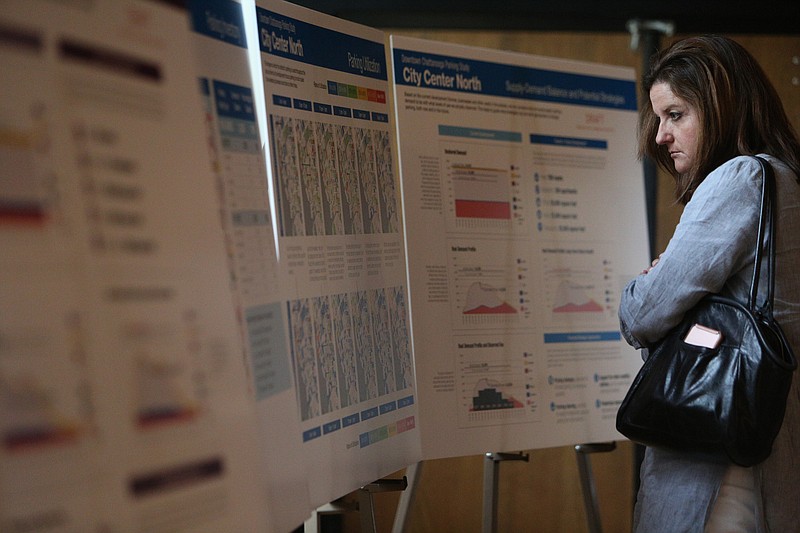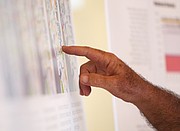A Chattanooga parking study open house brought several dozen residents to the Bessie Smith Cultural Center on Monday night to share their ideas and concerns.
The $250,000 study, launched in January and commissioned by River City Company and the Chattanooga Area Regional Transportation Authority, along with the city, calculated the downtown core and the Southside have about 43,000 parking spaces - public and private, on street and off street - all together.
"We have undertaken a pretty major effort in counting all the parking spaces," Joel Mann, a transportation planner with Nelson/Nygaard Consulting Associates, told the growing audience as the open house session began.
However, Mann said, it's not just how many spaces you have, it's how you use them and what changes might be needed to support the city's growth projections. It comes down to how different parts of the city use available parking and when. Office workers use spaces during the day, while residents use their spaces at night, he said.
Tameka Slaughter and Chioke Jaffree, who live in the M.L. King corridor area, came because they expect to see street parking, already crowded in their neighborhood, to face more challenges. Both said they wanted to know more about permit parking.
"I do think, with growth, it's going to reach us eventually," Slaughter said. "It's coming. So, I want to know, like, what are the options, what are we strategizing about it."
Jaffree said nearby short-term rental properties have put a strain on street parking, adding he knows that residents in other downtown areas have it even tougher.
"There's always someone parking in front of the house," Jaffree said. "So, having friends and family over, we have to work that out a little bit."
The study breaks the project area into seven different zones, each with its own set of needs, challenges and possible solutions. Key districts include the Southside, Riverfront, northern and southern divisions of the city center, the M.L. King Boulevard corridor, the University of Tennessee at Chattanooga and Erlanger and Siskin medical facilities.
Display boards lined the hall, allowing visitors to review the data and recommendations for each study district.
All kinds of solutions to parking shortages are under consideration, not just building new garages and lots. Other possibilities include figuring out how to get motorists to take advantage of low-demand parking spaces, using public transportation to connect remote parking to downtown destinations and changing pricing and regulations for public parking.
Southside resident Franklin McCallie said he would like to see more electric shuttles linking downtown to his community and to remote parking sites toward the eastern end of the Main Street corridor.
Kim White, president and CEO of River City Company, said it comes down to finding the right balance of solutions.
"To build a parking deck is very expensive," White said. "I don't think people realize it's about $25,000 to $28,000 a space to build a parking deck. We want to make sure that if we recommend a parking deck, that's the right solution."
There's a lot of "low-hanging fruit" out there, she said, citing the use of technology, in the form of smartphone apps and digital display boards, to help motorists find available parking.
"Knowing where the parking is and how we can use technology to help people find parking is what the big takeaway should be," White said.
River City Company will post the study results on its website sometime after Labor Day, she said. The study is expected to be completed by the end of September.
Contact staff writer Paul Leach at 423-757-6481 or pleach@timesfreepress.com. Follow him on Twitter @pleach_tfp.

